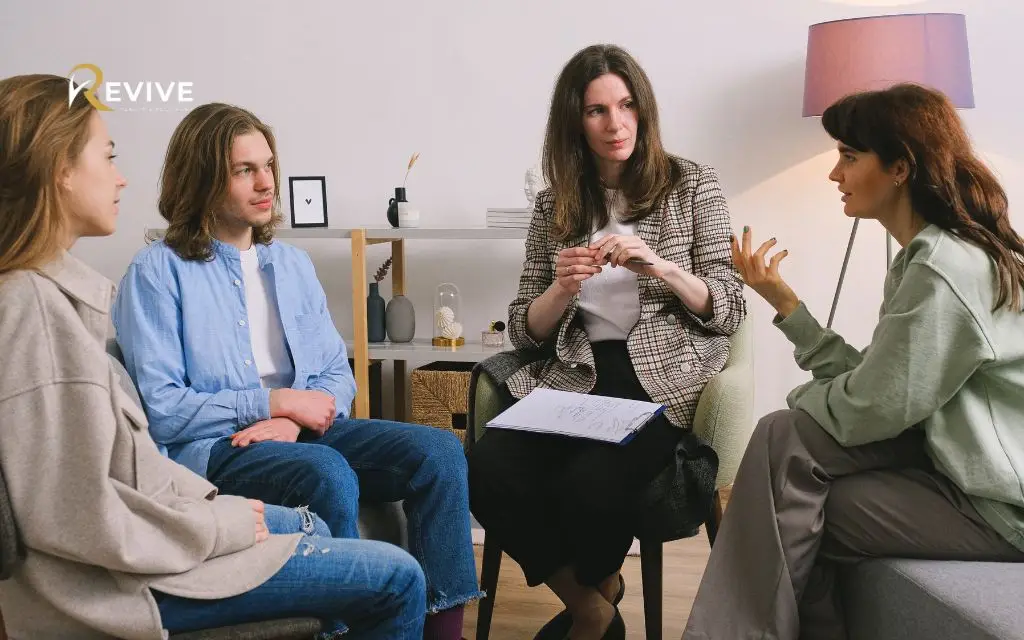Addiction doesn’t just affect the individual—it ripples through families, straining relationships and creating emotional challenges for everyone involved. For families navigating the impact of addiction, finding a way to heal together can feel overwhelming. That’s where family therapy for addiction Denver comes in, offering a supportive space to rebuild trust, improve communication, and work toward recovery as a unit.
At Revive Health Recovery, we understand the importance of involving loved ones in the healing process. Through expert mental health counseling and family-focused approaches, we help families strengthen their bonds and overcome the challenges of addiction together. Let’s explore how family therapy can be a powerful tool for recovery and a fresh start for everyone involved.
Understanding Family Therapy for Addiction
What is Family Therapy?
Family therapy is a type of talk therapy that helps families and couples build stronger, healthier relationships. It focuses on goals like:
- Reducing stress
- Building better coping skills
- Working together to solve problems
In addiction treatment, family therapy teaches family members how their actions may affect their loved one’s substance use. It also helps them learn healthier ways to respond, which can lead to positive changes. Everyone in the family can gain confidence, set clear boundaries, and practice new skills to support their loved one’s recovery journey.
How Addiction Affects Families?
Dealing with a substance use disorder (SUD) often feels like a personal struggle, but it can deeply impact everyone close to the person, including spouses, children, and parents. Addiction doesn’t just affect the individual—it affects the entire family.
When someone struggles with drugs or alcohol, it can bring both short-term and long-term challenges. Loving and peaceful homes may become filled with tension and conflict. Trust can fade if the person battling addiction becomes secretive or aggressive. Communication often breaks down, leading to frustration and hurt feelings. Marriages and relationships may suffer due to the strain caused by addiction.

Family members might witness heartbreaking changes, like a loved one’s health declining or their behavior becoming unpredictable. In some cases, they may lose contact with their loved one for long periods, only to discover devastating news about their condition. These experiences can cause family members to experience trauma, stress, and even develop unhealthy coping patterns, like becoming overly dependent on their loved one’s recovery.
Family support is crucial during this time. Together, families can work to rebuild trust, improve communication, and heal from the effects of addiction.
Benefits of Family Therapy for Addiction Denver
Family therapy can be super helpful for dealing with addiction. It’s not just for the person facing addiction—it also supports their family and loved ones.
Here are 6 great benefits of family therapy for addiction Denver:
- Strengthen Communication Skills
- Gain Addiction Knowledge and Resources
- Foster Family Harmony
- Break Enabling Habits
- Address and Heal Trauma
- Focus on Relapse Prevention Strategies
Strengthen Communication Skills
Family therapy for addiction Denver helps families reconnect and talk openly, especially if it’s been a long time since they’ve had honest conversations. Here’s how it helps:
- Creates a Safe Space: It gives everyone a neutral place to share their thoughts and feelings without judgment.
- Encourages Support: Family members can share their experiences and offer each other support.
- Teaches New Skills: Families learn new ways to handle challenges and cope with addiction.
Sometimes, unresolved anger or hurt feelings play a role in why someone started using drugs or alcohol. Talking about these feelings can be an important step toward healing and moving forward together.
Gain Addiction Knowledge and Resources
When you learn more about what causes addiction, you start to understand how it affects people. Addiction looks different for everyone, and each person’s experience with substance abuse is unique. By understanding what your loved one is going through, you may feel more compassion for their struggles and what they’re trying to overcome.
Foster Family Harmony
Sometimes family members feel like it’s their fault that a loved one struggles with addiction. But it’s important to know that you didn’t cause it, and you can’t fix it or control it on your own. Family therapy helps everyone understand that no one is to blame. Instead of pointing fingers, you can come together as a team and work toward positive goals for healing and growth.

Break Enabling Habits
You can help with recovery by spotting and stopping enabling behaviors. Enabling means doing things that unintentionally make it easier for someone to stay stuck in their addiction. This could be making excuses for them, covering up their mistakes, or taking care of their responsibilities.
Instead, it’s important to let them take responsibility for their actions and learn how to handle challenges without relying on substances. Family therapy is a great way for everyone to understand their role and learn how to break these patterns, creating a healthier and more supportive environment.
Address and Heal Trauma
Unresolved trauma can play a big role in addiction, but family therapy can help everyone work through it together. Here’s how it helps:
- It helps heal past hurts and rebuild family relationships.
- Families learn ways to handle triggers and difficult memories.
- It encourages better communication and brings family members closer.
- It creates a strong support system for tough times.
With these tools, families can grow stronger and face challenges together.
Focus on Relapse Prevention Strategies
When people hear “relapse,” they often think it means using drugs or alcohol again. But that’s just the last step in a longer process. By learning what triggers your loved one and recognizing early warning signs, you can step in and support them before they slip back into addiction. This way, you can help them stay on track.
Types of Family Therapy Options for Addiction Denver
Family therapists have many tools to help families dealing with substance use and mental health challenges, which often happen at the same time. They pick the best methods based on the family’s needs, issues, and how they interact with each other. Here are some common types of family therapy they might use.
Psychoeducation
Psychoeducation is when a therapist helps families learn about addiction and gives them tools to support their loved one’s recovery. It’s more than just handing out information or papers to read. This type of education helps families understand how addiction works and shows them how they can play an important role in encouraging their loved one to get treatment and stay on the path to recovery.
Multi-Dimensional Family Therapy (MDFT)
MDFT, or Multidimensional Family Therapy, is a type of therapy that helps teenagers and young adults who struggle with substance use, along with their families. It can also involve schools, welfare programs, and other support systems.
This therapy helps families learn better ways to solve problems, communicate clearly, and handle tough situations. It also teaches parents how to improve their parenting skills and helps reduce stress within the family, making things work better for everyone.
Behavioral Couples Therapy (BCT)
BCT, or Behavioral Couples Therapy, helps couples where one partner is dealing with a substance use disorder (SUD). This therapy focuses on two main goals: helping the partner with SUD stay substance-free and strengthening the relationship. It also brings extra benefits like better parenting, improved communication, and solving problems as a team.
BCT sessions usually take place with a licensed therapist in a safe, supportive setting. Therapists may use different methods, such as the Gottman approach, cognitive-behavioral techniques (CBT), or emotionally-focused strategies. BCT is especially helpful for couples facing challenges in their relationship and wanting to build a healthier, stronger connection together.

Behavioral Family Therapy (BFT)
BFT, or Behavioral Family Therapy, uses rewards and encouragement to help build and keep healthy habits. Sometimes called contingency management, it focuses on celebrating successes, like staying substance-free or reaching important goals. Families work together to set up agreements, learn new skills, and think in more positive ways.
The main goal of BFT is to help individuals improve their behavior while also making family relationships stronger and more supportive. By working as a team, families can create a healthier and happier home environment.
Functional Family Therapy (FFT)
FFT, or Functional Family Therapy, helps families learn new ways to work together and support a loved one struggling with substance use. Sometimes, the way family members interact can make risky behaviors worse without realizing it. FFT focuses on teaching healthier ways for families to communicate and solve problems.
How to Find the Right Family Therapy for Addiction Denver
When your family decides to start family therapy for addiction Denver, you might wonder how to find the right therapist. This is an important question, and choosing the right person can make a big difference. Having the right information can help your family get the most out of therapy and support everyone’s journey to healing and growth.
Research the Family Counseling Center Thoroughly
Begin by looking up family therapists who are qualified and experienced. Make sure they are a good fit for your family’s needs. Reading reviews from other families can help you understand what to expect and give you a sense of how helpful they’ve been to others.
Check to see what kinds of treatments they offer. Look for programs that use proven methods to treat addiction, not just general counseling. Finding the right therapist with the right approach can make a big difference for your family.

Review the cost of treatment services
The cost of family therapy can be different depending on where you live and how long each session lasts. It’s important to make sure the therapy fits your budget so it doesn’t cause extra financial stress. If the fees aren’t clear, don’t be afraid to ask about the cost before starting. Also, check if your health insurance covers therapy to help with the expense.
Schedule a consultation before starting therapy
Many therapists let you have a consultation session before starting treatment. This is a great chance to see if the therapist is a good match for your family. You can ask questions about how they help families and talk about what your family needs. This can help you choose the right therapist for everyone.
Evaluate progress after each therapy session
After one or two sessions, take some time to think about how you and your family feel about the therapist. Do the sessions feel helpful? Are you comfortable talking about personal things? Notice how the therapist acts and how your family reacts to their advice. These things can help you decide if this therapist is the right choice for your family.
Practice patience and self-compassion
Therapy takes time to show big changes, especially when working on family problems. Finding the right therapist is important, but being patient and sticking with the process matters just as much. Healing happens step by step, so keep working together as a family and stay open to advice and help from your therapist.
Tips to Get the Most from Family Therapy for Addiction Denver
Family therapy can be a powerful tool in addiction treatment, helping you build a stronger path to recovery and healthier family relationships. Addiction doesn’t just affect the person struggling—it impacts the entire family. Family therapy works to reduce these negative effects and create a supportive environment for everyone.
To make family therapy work, it’s important to stay committed and take steps outside of the sessions. Here are some tips to help:
- Listen carefully. Don’t just wait for your turn to talk. Pay attention to what your family members are saying and ask questions to really understand their feelings.
- Keep a therapy journal. Write down your thoughts, feelings, or questions after each session. This helps you reflect on what you’ve learned and prepare for the next meeting.
- Prepare yourself. Rest, eat well, meditate, or do something calming before therapy. Starting the session with a clear mind and open heart makes a big difference.
- Be patient. Healing takes time. Celebrate small wins with your family and stay hopeful as you work together toward progress.
Family therapy is a journey, but with dedication and teamwork, it can lead to lasting change and a healthier future.

Conclusion
Family therapy for addiction Denver offers families a chance to heal together, strengthening bonds and creating a healthier environment for recovery. It helps rebuild trust, improve communication, and break unhealthy patterns that may have contributed to addiction.
At Revive Health Recovery, expert therapists guide families toward understanding, acceptance, and lasting change. By learning new skills and working as a team, families can overcome challenges and build a brighter future together. Remember, recovery is a journey, and with the right support, every family can find hope, healing, and a stronger connection.



